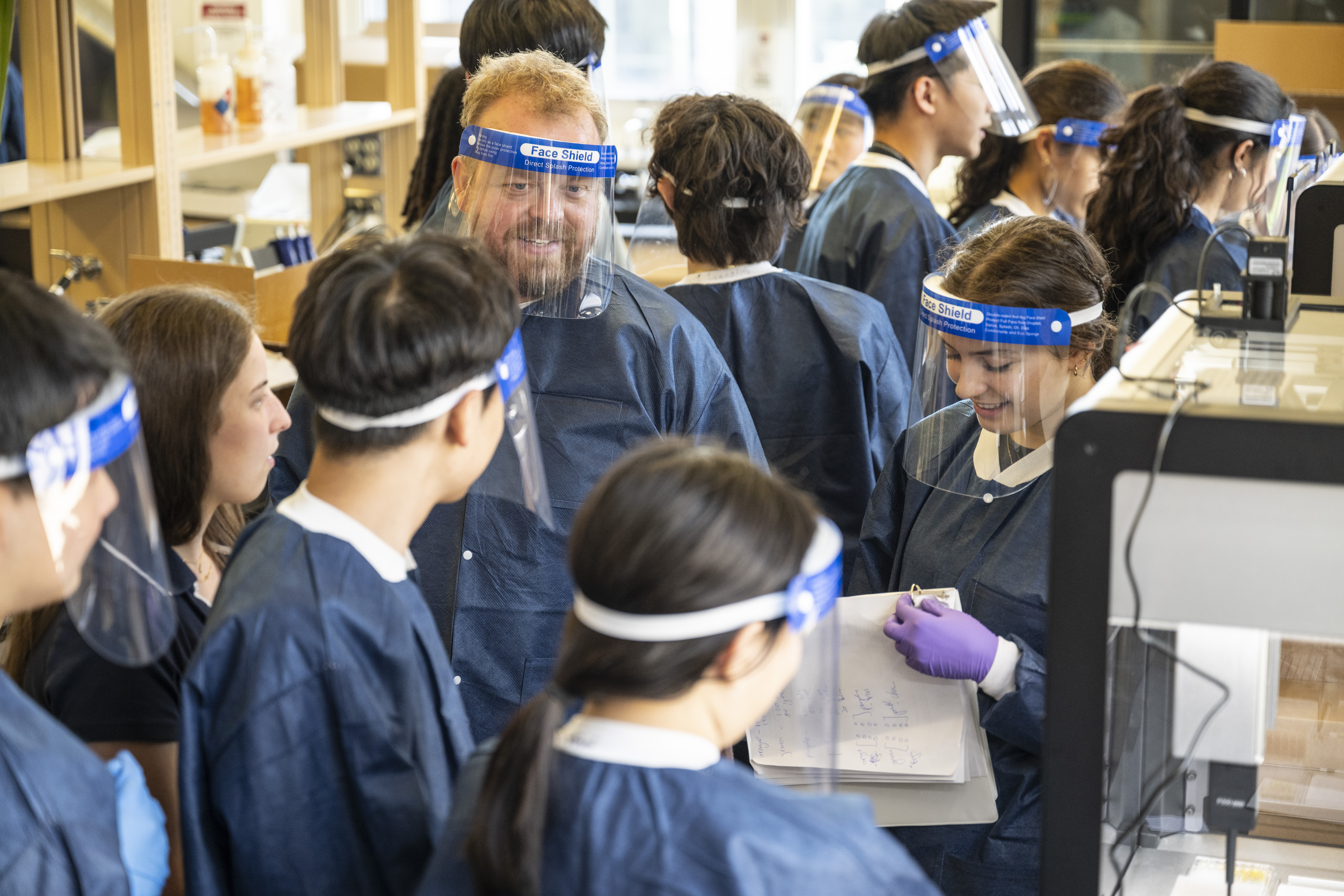Computational Biology
Empowering diverse young minds to apply computation to solve research-inspired questions in modern biology.
Program Overview
The Pre-College Program in Computational Biology immerses students in cutting-edge laboratory techniques and the computational methods that bring biological data to life.
Computer science has transformed biology and medicine, and the next generation of life scientists must be fluent in both generating data in the lab and interpreting it with powerful computational tools. Our program gives high school students a rare chance to explore this interdisciplinary frontier in a university setting.
Students tackle real research-inspired problems, from studying microbes in Pittsburgh’s local ecosystems to investigating the impact of COVID-19. After collecting samples in the field, they will isolate bacterial DNA, fragment it into millions of sequences, and analyze these sequences using the same approaches used by computational biologists worldwide.
Each day highlights the synergy between experimentation and computation. Half the day is spent in a hackathon, with students working in teams to code solutions to computational questions inspired by biology. The other half takes place in the lab, where students generate the very datasets they’ll later interpret with their own code.
Carnegie Mellon University, a global leader in automated science, gives students the chance to work with robotic laboratory equipment. Using tools like the Opentrons OT-2 liquid handling robot and custom automation platforms, our students will see firsthand how machine learning and artificial intelligence are reshaping how science is done.
To prepare for the program, admitted students will complete foundational coding lessons from Programming for Lovers, an open education project developed by Professor Phillip Compeau. These preparatory materials ensure that every student arrives ready to dive into computational biology, regardless of prior programming experience.
Curriculum
Programming Preparatory Materials
Admitted students will receive preparatory materials drawn from Professor Phillip Compeau’s Programming for Lovers project. These interactive lessons provide the fundamental programming skills needed for the program. Completion of selected assignments before the program begins is required.
Module 1: Metagenomics
- How do we design experiments to learn about microbes in the environment?
- How do we collect samples from local rivers?
- How do we generate DNA sequence data from water samples?
- How can we extract DNA from diverse organic material (viruses, plants, bacteria, other microorganisms)?
- How can evolutionary and molecular biology guide us to focus on bacteria?
- How can we use sequence data to measure diversity in rivers?
- How can we compare microbial populations between two samples?
- What factors drive microbial diversity in river ecosystems?
Module 2: Sequence Alignment
- How can we isolate and identify bacteria in the lab?
- How do we extract DNA from bacteria?
- How do we match DNA sequences to databases of known organisms?
- How can we quantitatively compare two DNA strands using only A, C, T, and G?
Module 3: Genome Assembly
- How can we break genomes into many small pieces for sequencing?
- How can we sequence very long strands of DNA?
- How do we assemble short strands of DNA to reconstruct genomes of organisms?
- With an assembled genome, how can identify genes and determine the function of those genes?
Module 4: Evolutionary Tree Construction
- What are the evolutionary relationships among bacteria in Pittsburgh’s rivers?
- Can we use viral evolutionary trees to trace the origin of SARS-CoV-2 in the U.S.?
- How can we visually compare multiple sequences?
- How can we pinpoint mutations in coronavirus genomes to identify variants?
Module 5: Automated Science
- How can liquid-handling robots increase the efficiency and precision of experiments?
- How can robotics help isolate extremophile bacteria?
- How can we train machine learning models to predict bacterial growth conditions?
- How can artificial intelligence guide experimental design to answer scientific questions?

Application Details
Program Length
June 20 to
July 18, 2026
(4 weeks)
June 20, 2026: Opening Day
Early Deadline

Scholarship and International applications must be submitted by this deadline. 11:59PM EST.
Fixed admissions. Decisions sent on March 15.
Final Deadline

Fixed admissions. Decisions sent on April 15.
Housing Options
Resident
or
Commuter
To be a commuter, the student and parent/guardian must have a permanent residence within approximately 30 miles of our Pittsburgh campus or within Allegheny County.
Eligibility and Application Requirements
Eligibility Requirements
To be eligible for Pre-College Computational Biology, students must:
- Be at least 16 years old by the program start date.
- Be a current sophomore or junior in high school at the time of application submission. Please note: Talented sophomores are encouraged to apply, however, most of our admitted students will be juniors.
- Have an academic average of B (3.0/4.0) or better.
Application Requirements
The complete application for Pre-College Computational Biology consists of the following:
- Completed online application
- Unofficial transcript
- Standardized test scores (optional)
- One letter of recommendation
- Responses to essay prompts
Application Essay Prompts
Essays are required for the following prompts (300-500 words each):
- What do you hope to gain from participating in Carnegie Mellon’s Pre-College Programs?
- Why are you interested in studying Computational Biology?
Frequently Asked Questions
What is computational biology?
Great question! The short answer is the application of high-powered computational approaches to analyze biological or medical datasets. For a lengthier explanation, check out the first 20 minutes of this video recorded by Professor Compeau.
Is this the right fit for me?
If you are good at math and love science, we think you’re in the right place.
Do I need to bring my own computer? What other supplies do I need?
Because our program is heavily dependent on coding, each student in our program will need to bring a laptop. We will provide all other resources needed.
Will I earn college credit from this program?
No, Pre-College Computational Biology students do not earn college credit.
Are international students allowed to participate?
Yes, our program is open to international students as long as they are able to enter the United States and come to Pittsburgh. They are not, however, eligible for scholarship consideration.




